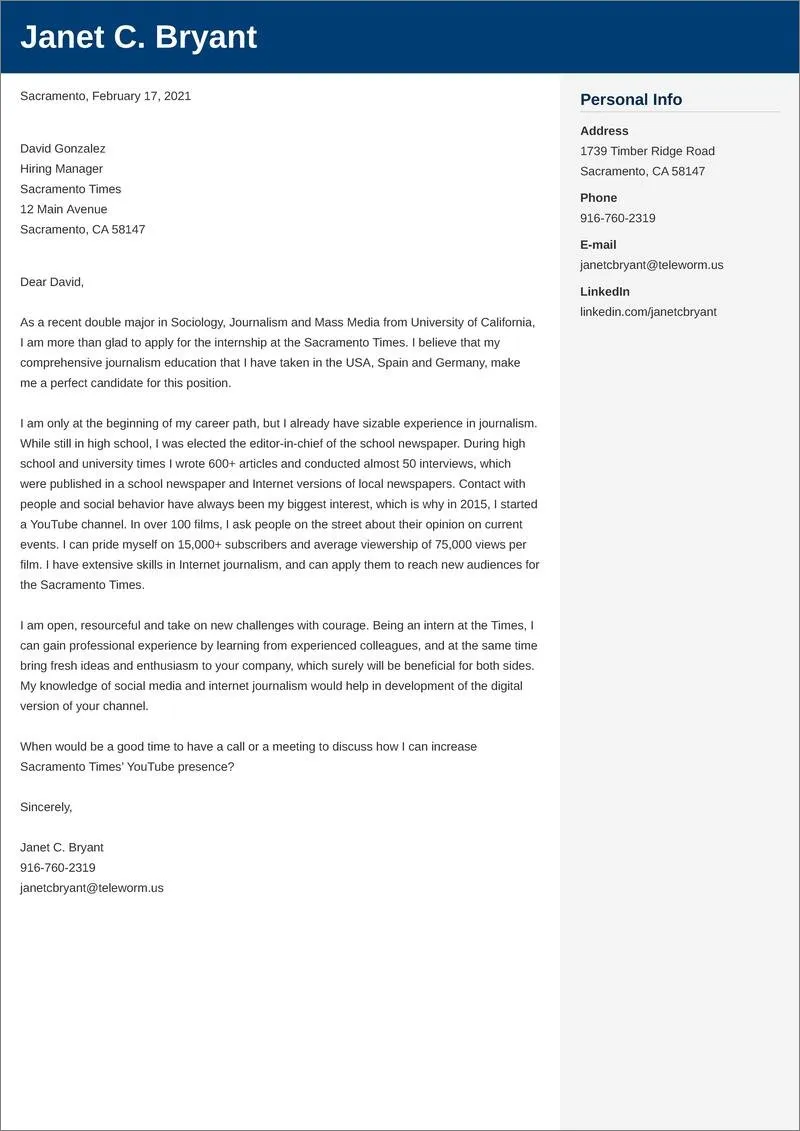Cover Letter for Journalism Jobs Why It Matters
In the competitive world of journalism, a well-crafted cover letter can be your golden ticket to landing your dream job. It serves as your first impression, a chance to showcase your skills, experience, and passion for the field. Unlike a resume, which provides a factual overview of your background, a cover letter allows you to tell a story, to connect with the hiring manager on a personal level, and to demonstrate why you’re the perfect fit for the position. A strong cover letter can highlight your unique abilities, explain any gaps in your resume, and show your genuine interest in the specific opportunity. It’s an opportunity to go beyond the basics and express your enthusiasm for journalism, making you stand out from the crowd of applicants and increasing your chances of getting an interview. It’s essential to recognize the importance of the cover letter and take the time to make it shine.
Highlighting Your Skills in a Cover Letter
Your cover letter is the perfect platform to spotlight your key skills, the very tools of the trade for a journalist. Begin by identifying the skills most relevant to the job description. Are they looking for someone with strong writing abilities? Research experience? Communication skills? Tailor your letter to showcase those specific areas. Be specific; don’t just say you have good writing skills, provide examples. Perhaps you’ve written in-depth articles that resulted in positive feedback, or maybe you’ve won a writing award. Quantify your achievements whenever possible. Saying you ‘increased readership by 20%’ is far more impactful than simply stating you ‘improved readership.’ Use action verbs to describe your accomplishments: ‘researched,’ ‘wrote,’ ‘investigated,’ ‘interviewed.’ By focusing on specific skills and achievements, you create a compelling narrative that makes you a strong candidate for the position.
Showcasing Writing Skills
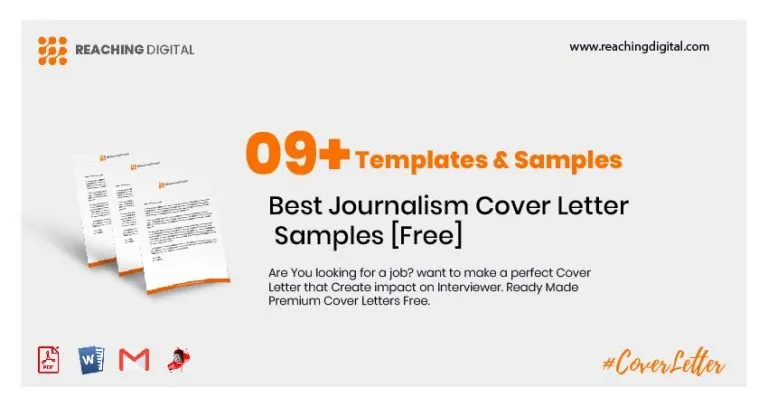
Writing is the cornerstone of journalism, so this skill should be prominently featured. In your cover letter, demonstrate your writing prowess through vivid examples. Mention the types of articles you’ve written – news reports, features, opinion pieces – and the publications or platforms where they appeared. Briefly describe the impact of your writing. Did your investigative piece lead to positive change? Did your feature story attract a large audience? Mention any writing awards or recognition you’ve received. Focus on clarity, conciseness, and the ability to engage readers. Highlight your ability to adapt your writing style to different formats and audiences. If the job requires a specific style, mention your experience with that style. Proofread your letter meticulously, as errors will undermine your credibility as a writer. Your cover letter is a writing sample itself, so make it count.
Emphasizing Research Abilities
Journalism relies heavily on thorough research, so be sure to highlight your abilities in this area. Describe your research process, including the tools and methods you use. Do you have experience with databases, public records, or interviewing sources? Detail any complex research projects you’ve undertaken. Did you uncover a significant story through diligent investigation? Mention any fact-checking experience or skills you possess. Highlight your ability to verify information and ensure accuracy. Give examples of instances where your research led to valuable insights or a significant story. Show the hiring manager that you’re capable of conducting in-depth research and presenting your findings clearly and accurately. Your ability to find and verify information is essential.
Demonstrating Communication Prowess
Effective communication is vital for journalists, so make sure to emphasize your skills in this area. Talk about your experience in interviewing people, building relationships with sources, and presenting information clearly. Highlight your ability to adapt your communication style to different audiences and situations. Do you have experience in public speaking or presenting? Mention any experience with social media or online communication platforms. Show how you can connect with people from all walks of life and gather information through interviews and conversations. Give examples of times you successfully communicated complex information. Journalists need to be able to speak with various people, so communication skills are essential.
Tailoring the Cover Letter for Journalism
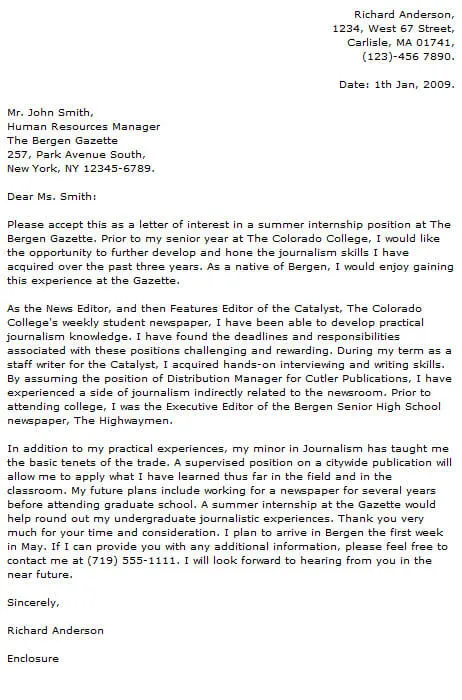
A generic cover letter will likely end up in the rejection pile. To stand out, you must tailor each letter to the specific job and media outlet. Start by carefully reading the job description. Identify the key skills and experiences the employer is seeking. Use those keywords in your letter to demonstrate that you have what they need. Research the media outlet. Understand its mission, audience, and style. Show that you understand the outlet’s content and target demographic. Mention specific articles or stories you admire and explain why. If possible, address the letter to the hiring manager by name. Demonstrating that you’ve done your homework will impress the hiring manager. Avoid using templates. Each letter should be unique and reflect your understanding of the job and the media outlet.
Researching the Media Outlet
Before you start writing, delve deep into the media outlet’s work. Read recent articles, watch videos, and listen to podcasts to understand their style, tone, and target audience. Familiarize yourself with their coverage areas and the kinds of stories they prioritize. This research will provide you with valuable insights that you can use to tailor your letter. Mention specific pieces of content that have impressed you. Explain why you admire the work. Show that you understand the outlet’s values and goals. Demonstrate how your skills and experience align with their needs. Researching the media outlet demonstrates your interest and shows that you’re serious about the opportunity.
Addressing the Hiring Manager
Whenever possible, address your cover letter to the hiring manager by name. This shows that you’ve taken the time to find out who will be reading your application and personalizes your letter. If you can’t find the hiring manager’s name, use a professional greeting, such as ‘Dear Hiring Manager,’ or ‘Dear [Department Name] Team.’ Avoid generic greetings like ‘To Whom It May Concern,’ which can make your letter seem impersonal. If you find a name, make sure to spell it correctly. In your letter, mention how your skills and experience align with their needs. This personalization sets your letter apart from generic applications.
Writing a Compelling Opening
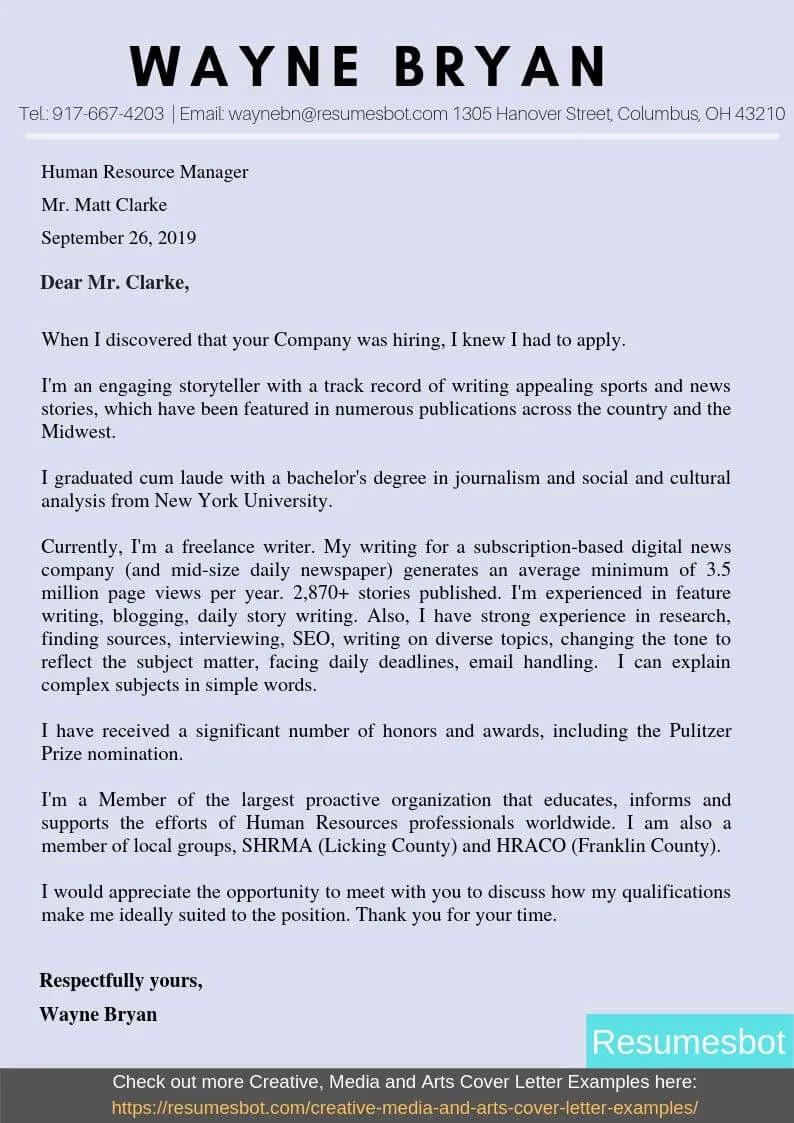
The opening paragraph of your cover letter is crucial; it’s your chance to grab the hiring manager’s attention. Start with a strong hook that immediately demonstrates your interest in the position and the media outlet. Clearly state the position you are applying for and where you saw the job posting. Briefly mention your key skills and experience and how they align with the job requirements. You might mention a specific achievement or a relevant project that makes you stand out. Avoid generic statements like ‘I am writing to express my interest.’ Instead, craft an opening that is enthusiastic and specific to the role. Make sure your opening paragraph sets the tone for the rest of the letter. Your goal is to encourage the hiring manager to keep reading.
Structuring the Body of Your Cover Letter
The body of your cover letter should expand on the skills and experiences mentioned in your opening. Organize your letter logically, using separate paragraphs to address different aspects of your qualifications. Focus on the most relevant experiences and accomplishments. Provide specific examples to support your claims. Use the job description as a guide, ensuring you address the key requirements. Quantify your achievements whenever possible. Show how your work had a positive impact. Maintain a professional tone throughout the body of the letter. Highlight the skills you have by using strong action verbs to describe your work. The body of your letter should show why you are the best candidate.
Mentioning Relevant Experiences
Detail your relevant experiences. Provide specific examples to show how you’ve used your skills in the past. Describe the types of stories you’ve written, the media outlets you’ve worked with, and the projects you’ve completed. Highlight any internships, volunteer work, or freelance opportunities that are relevant to the job. Mention any specialized training or certifications you have. If you have experience in a particular area of journalism, such as investigative reporting or multimedia storytelling, be sure to highlight it. Show that you have a solid foundation of experience that prepares you for the role. Provide specifics regarding your past work.
Highlighting Your Accomplishments
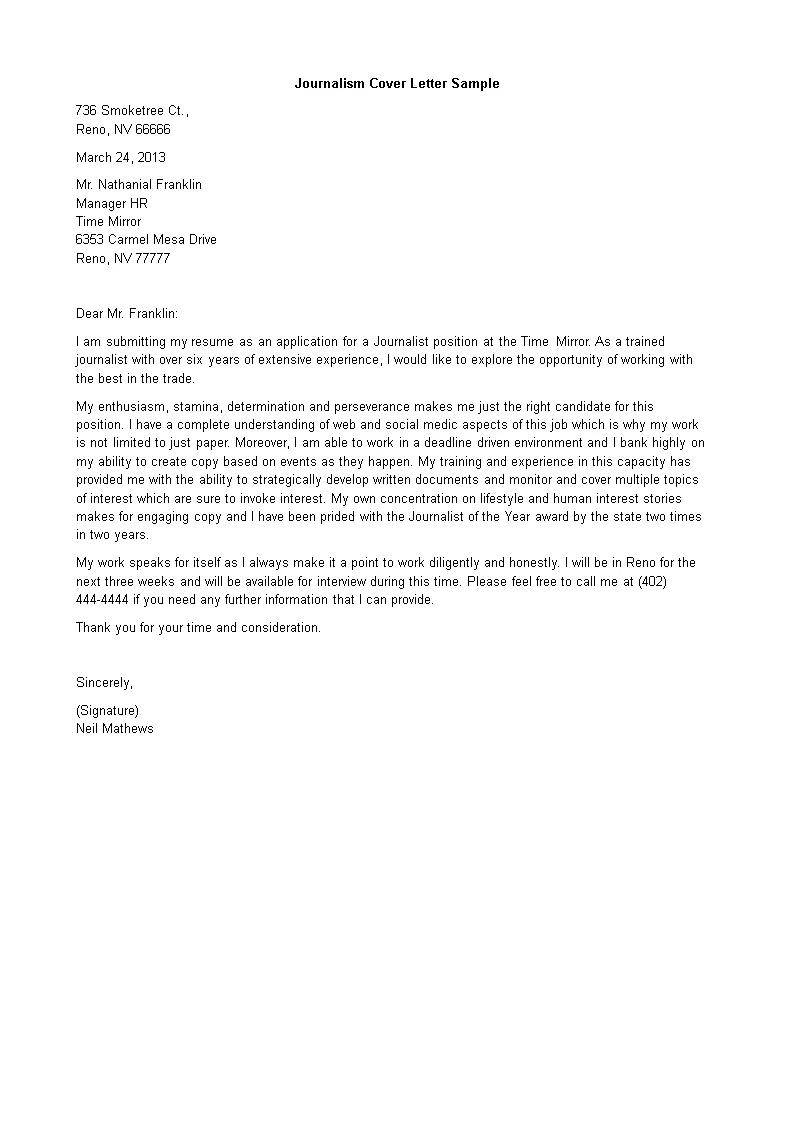
Focus on your accomplishments. Don’t just list your job duties; show what you’ve achieved. Quantify your results whenever possible. Instead of saying you ‘wrote articles,’ state that you ‘wrote 50 articles’ or that your articles ‘increased website traffic by 15%.’ Mention any awards, recognition, or positive feedback you’ve received for your work. Showcase your ability to deliver results and make a positive impact. By highlighting your accomplishments, you’ll show the hiring manager why you’re a valuable asset to the team. Back up your skills with a record of success.
Crafting a Strong Closing
The closing paragraph of your cover letter is your last chance to make an impression. Restate your interest in the position and the media outlet. Thank the hiring manager for their time and consideration. Express your enthusiasm for the opportunity to discuss your qualifications further. Include a call to action. For example, you might say, ‘I am eager to discuss how my skills and experience can benefit your team’ or ‘I look forward to hearing from you.’ End with a professional closing, such as ‘Sincerely’ or ‘Best regards,’ followed by your name and contact information. Keep it concise, and leave the hiring manager with a positive final thought.
Proofreading and Editing Your Cover Letter
Before submitting your cover letter, proofread it carefully. Errors can undermine your credibility. Check for spelling mistakes, grammatical errors, and typos. Ensure that your sentences are clear, concise, and easy to understand. Read the letter aloud to catch any awkward phrasing. Ask a friend, family member, or career counselor to review your letter. A fresh pair of eyes can often spot errors you may have missed. Proofread every time, and pay attention to details. This will help you to make sure that you are putting your best foot forward. A polished cover letter will improve your chance of getting the job.
Seeking Feedback Before Submission
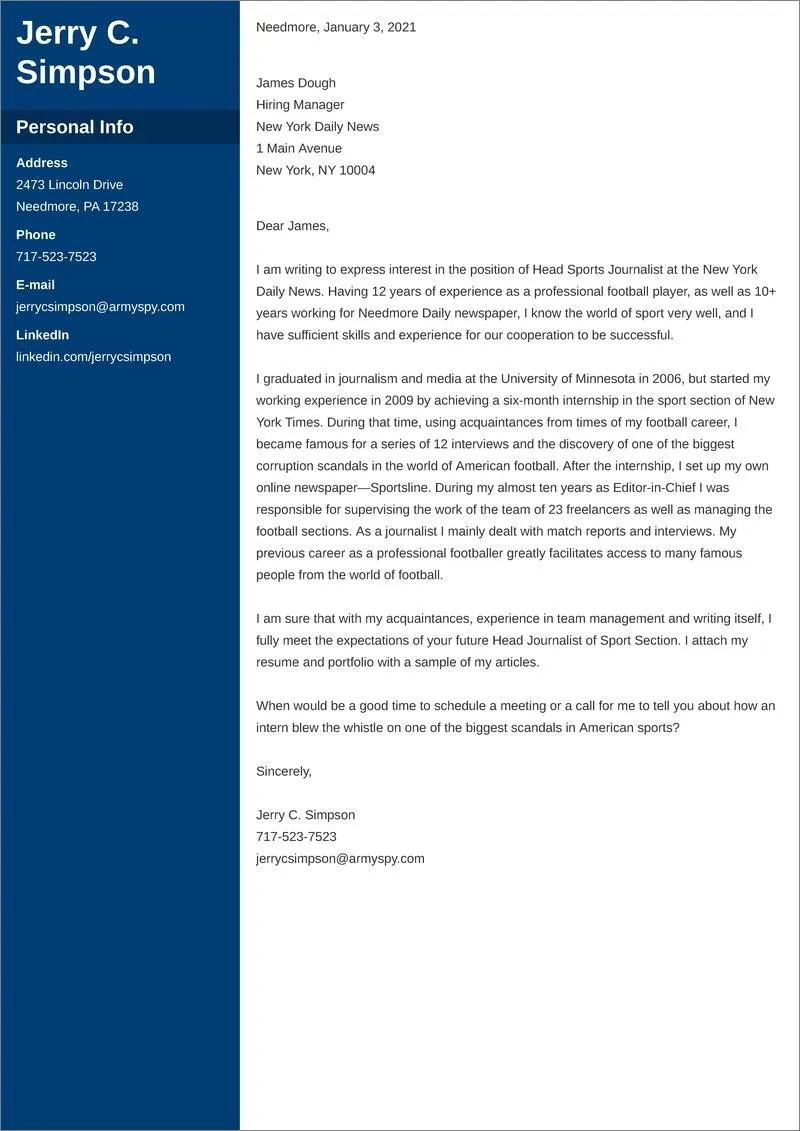
Before submitting your cover letter, seek feedback from trusted sources. Ask a career counselor, mentor, or experienced journalist to review your letter. They can offer valuable insights and suggestions for improvement. Get input on the content, structure, and overall effectiveness of your letter. Ask them to check for any errors or areas where you could strengthen your message. Be open to criticism and willing to make revisions based on their feedback. A second or third look can significantly improve your cover letter. Getting a fresh perspective can help you make sure that you are submitting your best work.
